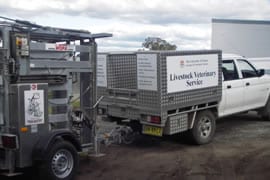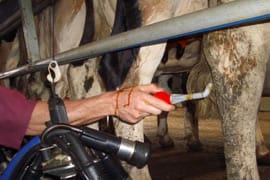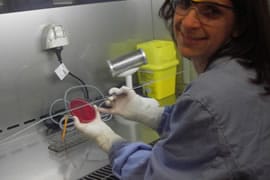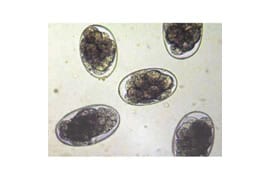Livestock and Veterinary Services
Ambulatory Livestock Veterinary Service
Operates: 8 am to 5 pm Monday through Friday.
Emergency: 7 days a week.
The Livestock Veterinary Service regularly attends to sick livestock on local farms. It is important when calling for veterinary assistance that animals are yarded. It is difficult to provide veterinary attention if the animal cannot be caught and safely restrained.
Sheep, goats, and calves which can be transported to the livestock unit can be attended to by our team of veterinarians in our hospital facilities. Animals can be hospitalised when emergency and intensive care is required.

Herd Health Services
The Livestock Veterinary Service provides regular herd health services for farms across NSW. Farm visits are scheduled every 2 to 4 weeks according to need. Herd health services are directed at managing herd reproduction, heifer replacements, mastitis, lameness and nutrition.
Records analysis is utilised to monitor herd outcomes providing feedback to managers regarding areas that are achieving or failing to achieve targets.
Ancillary Support Services
Is your bull team up to scratch? Low pregnancy rates can be economically devastating. Veterinary Bull Breeding Soundness Exams (VBBSE) can help to identify bulls at risk of problems, thereby potentially reducing the risk of low pregnancy rates. Removing infertile or sub-fertile bulls may also allow a reduction in bull numbers with a similar pregnancy rate, thereby reducing some costs.
Livestock Veterinary Services offer VBBSE for sale and pre-joining purposes. The results are reported using Australian Cattle Veterinarians Bull Reporter software and standardised forms by an accredited veterinarian, which is a requirement of some breed societies for pre-sale examinations.
Please contact us for details.
 |
The Livestock Veterinary Service provides a foot trimming service using a transportable Wopa foot trimming crush. Shahab Ranjbar heads up this service, Shahab is currently researching risk factors for and is investigating management strategies to prevent and treat lameness in dairy cattle. |
 |
Milking procedure and equipment have the potential to facilitate or compromise cow comfort, health, and production. A high incidence of mastitis compromises cow welfare and farm profitability. The Livestock Veterinary Service offers mastitis and high somatic cell count investigation services including assessment of milking routines and milking machine function. This service is supported by our milk culture laboratory. |
 |
There are many organisms that can cause mastitis, identifying which organisms are involved is useful for determining the source of infection and to identify management procedures that are likely to help prevent further animals becoming affected. The milk culture laboratory is utilised to support mastitis investigations. |
 |
Faecal egg counts and drench tests Internal parasitism is a common problem in the Camden region frequently causing disease and mortality in sheep and goats. The problems associated with internal parasites are exacerbated by a high incidence of resistance to the commonly available deworming products. Pre- and post treatment faecal egg counts are useful to determine: - if worming is necessary. - the effectiveness of the products used. - whether resistant parasites are present in the herd. - the level of resistance. |